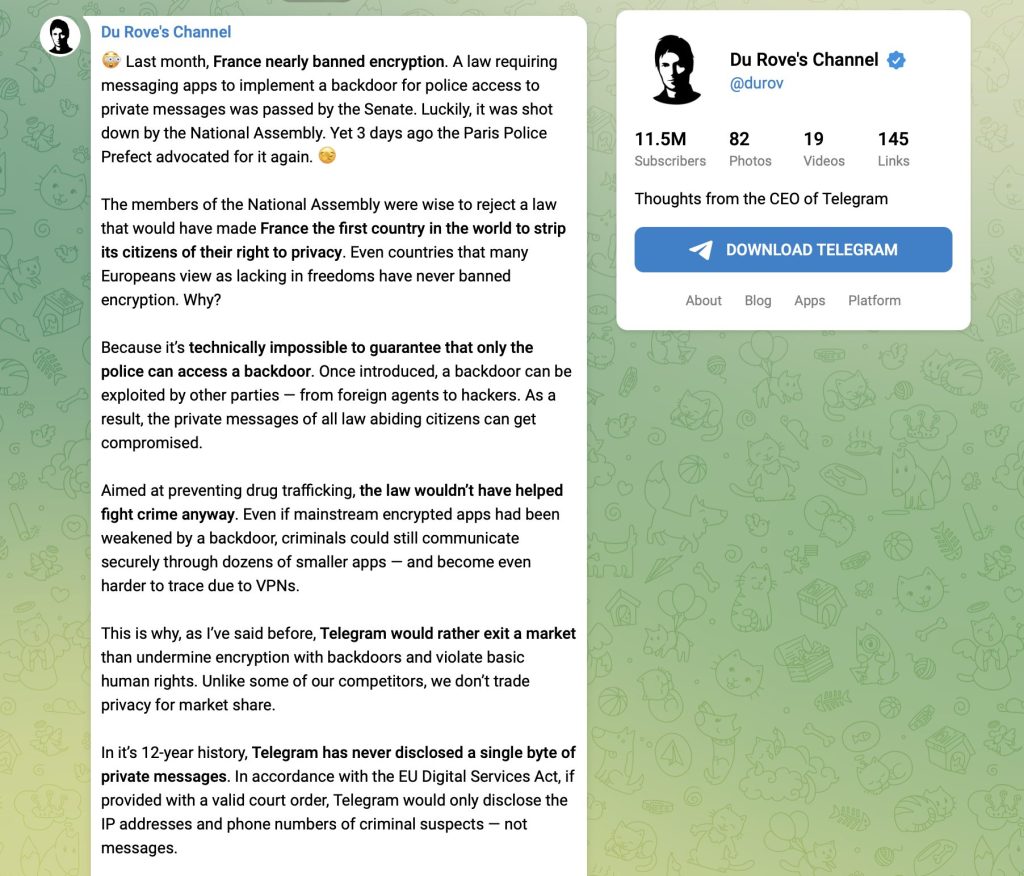Telegram’s Strong Stand on User Privacy: CEO Pavel Durov’s Bold Declaration
The landscape of digital communication is constantly evolving, and with it comes the critical issue of user privacy. Telegram’s CEO, Pavel Durov, has once again taken a definitive stance on this topic as the platform navigates turbulent waters amid legislative attempts aimed at undermining encryption. This bold declaration emphasizes that Telegram is ready to make significant sacrifices, including potentially exiting certain markets, to protect its users’ privacy and uphold digital freedom.
Legislative Pressures: A Growing Threat to Encryption
Recently, France has dominated headlines with its controversial efforts to impose backdoors in encryption for law enforcement access to private messages. Durov reacted strongly to a recently passed law in the French Senate, which aimed to enforce such backdoor access. Although the National Assembly ultimately rejected the proposal, the conversation about diminishing encryption safeguards is far from over. Alarmingly, just days ago, the Paris Police Prefect renewed calls for these measures.
“Last month, France nearly banned encryption. A law requiring messaging apps to implement a backdoor for police access to private messages was passed by the Senate. Luckily, it was shot down by the National Assembly. Yet 3 days ago the Paris Police Prefect advocated for it again.” — Pavel Durov (@durov) April 21, 2025
Understanding the Risks: Why Backdoors Are a Bad Idea
In his remarks, Durov articulated a critical concern: the inherent dangers that encryption backdoors pose. He explained that once a digital vulnerability is opened for law enforcement, it paves the way for exploitation by hackers, foreign agents, and other malicious actors. Durov argues that this is not merely a technical issue but a grave threat to individual privacy and freedom of expression in the digital realm.

“Even countries that are often criticized for lacking civil liberties have never gone so far as to ban encryption,” he noted, reflecting on the precarious balance between security and civil liberties. Durov’s commitment to user privacy remains steadfast, presenting an unwavering front against external pressures to compromise encryption integrity.
Why This Matters: Protecting Individual Freedom
The discussions surrounding encryption policies are symptomatic of larger global debates about digital rights and individual freedom. With governments increasingly seeking ways to monitor online communications, the implications of weakened encryption could be dire. Users would not only see their privacy under threat, but they might also find themselves vulnerable to systemic abuses of power.
The Inefficacy of Relinquishing Encryption
Delving deeper into his argument, Durov pointed out an important paradox: laws designed to restrict encryption may hinder law-abiding citizens while failing to deter criminals. The reality is likely that those with malevolent intentions would migrate to lesser-known, unregulated applications or utilize VPNs to sidestep surveillance. The ramifications of compromised privacy would primarily disadvantage everyday users trying to communicate safely.
Telegram’s Recent Policy Changes: A Balancing Act
Despite Durov’s strong advocacy for privacy, Telegram did implement a notable policy adjustment in September 2024 that reflects the growing pressures faced by tech companies. The new terms grant Telegram the ability to share user IP addresses and phone numbers with authorities if presented with credible legal requests, such as court-issued warrants.
This move, documented in section 8.3 of the updated terms of service, is a double-edged sword — allowing for limited cooperation with law enforcement while attempting to maintain the essence of user privacy. Durov emphasized that Telegram will not prioritize market demands over the fundamental rights of its users, stating, “We don’t trade privacy for market share.”
Expert Opinions: The Regulatory Landscape’s Shifting Tides
According to legal experts, including Daria Lysenko from the law firm SBSB, the evolving regulatory environment presents a multifaceted challenge for tech companies like Telegram. There is a tangible risk that compliance pressures may force such companies to alter their privacy commitments, with far-reaching consequences for users.
Future Outlook: Could Telegram Leave Certain Markets?
Looking forward, Durov’s warnings illustrate a potential reality where Telegram might have to sever its ties with certain jurisdictions to uphold its core principles. With increasing regulatory directives demanding access to encrypted communications unlike any previous norms, the question looms: How far will companies like Telegram go to protect user privacy?
Conclusion: The Call for a Collective Response
Durov’s recent statements are a clarion call to both users and policymakers alike. The challenge lies in recognizing the vital importance of encryption as a cornerstone of digital freedom. What are your thoughts on the balance of privacy and security? Join the conversation and let us know how you envision the future of secure communications.

